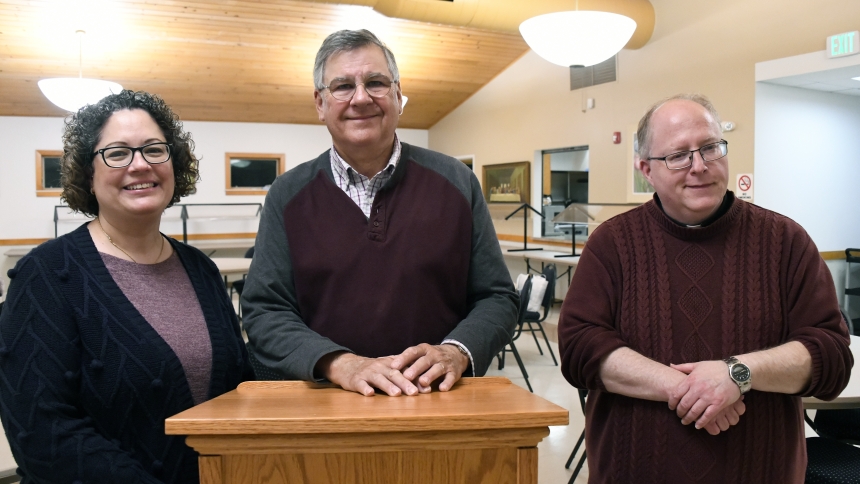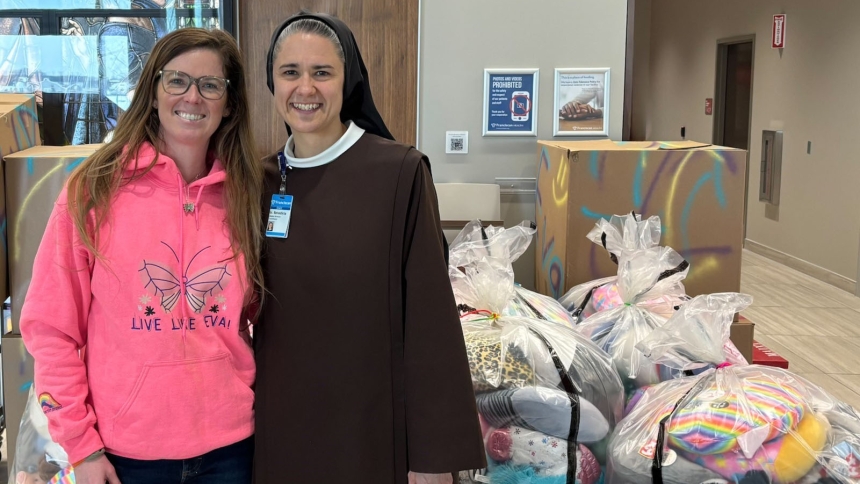
LAPORTE – The Catholic Church’s view of marriage has not changed since Jesus presented his teachings. Today’s faithful and those seeking full communion can approach the Church for remedy through annulment when relational bonds end and presumptions are not what they were thought to be.
Concepts that are often casually discussed in modern society, such as marriage, re-marriage, divorce, annulment and separation may be misunderstood, so marriage tribunals are staffed in dioceses throughout the world to offer clarity and advocate for sacramental marriage.
“It really is worth making the call to the marriage tribunal,” Diocesan Judicial Vicar and canon lawyer Father Brian Chadwick said. “As a pastor (at Our Lady of Grace in Highland), I welcome people to talk about the process. It’s important that somebody at a parish works with you as a sounding board, at least at first.”
Father Chadwick and the marriage tribunal staff wanted to improve accessibility to information, so they offered an “annulment talk” on April 25 at Holy Family Parish’s Sacred Heart campus. Father Chadwick was accompanied by diocesan staff members Teri Kopil and Milly Virus at the evening gathering.
Two-dozen individuals attended the meeting, listening first to an introduction and talk by Father Chadwick about basic concepts and definitions and later peppering him with questions. The largely female audience ranged from about 25 to 75 years old.
Father Chadwick warned the guests that he would “sometimes speak with a little jargon – sometimes it cannot be helped as our Church’s canon law and theology on marriage sometimes comes with that.”
Kopil and Virus passed out brochures and a tribunal terms vocabulary list. Father Chadwick said, “If I am saying something and it causes you to have a question, raise your hand … I’m here to answer any questions you have about the annulment process.”
Father Chadwick began his presentation with a question, “Why are annulments necessary?”
To clear up a common misconception about annulments, or “declarations of nullity” he said, “Technically, we don’t ‘do something’ to the marriage, we make a declaration that a marriage is invalid or null from the beginning.”
Annulments are necessary because marriage is, by nature, indissoluble for life – “till death do us part,” explained Father Chadwick. “In four basic places in the Gospel, Jesus makes it clear that divorce and remarriage is considered adultery. Marriage creates a bond between a man and a woman that is indissoluble.”
That “bedrock principle” is why many in the audience chose to attend, he suggested.
A question Father Chadwick has fielded countless times, “Is it possible for me to marry again after a divorce?” gave him the opportunity to define terms and review various scenarios people find themselves in and how they can be prepared to enter a sacramental marriage.
Guests flipped through their documents, some writing down definitions and giving quizzical looks.
“It may be a bit counterintuitive and difficult to wrap one’s mind around, but (with) the position of the Catholic Church – from the teachings of Jesus, and natural law, understanding what marriage is – we take a different view than society today,” Father Chadwick said. “Our society back in the year, let’s say, 1900, would have held a very similar view to the Church’s.”
The judicial vicar explained that an annulment is not a divorce. He added that the Church considers civil divorce merely a separation.
“Consent makes marriage,” Father Chadwick stated. “Parties consent to marriage by their vows. Unique among the seven sacraments, the priest, the bishop or the deacon who witnesses the marriage does not actually perform the sacrament.”
The only way for a marriage to have been invalid, he explained, is for there to have been something defective about the vows, or a “defect of consent.”
Father Chadwick reviewed several grounds or reasons that consent to marriage can be defective, among them: a lack of capacity to assume the obligations of marriage, intention against permanence of marriage, intention against fidelity, intention against having children, and force or fear.
Among the many questions directed to Father Chadwick, a woman in her 60s asked, “Does there have to be a divorce decree before the (annulment) filings can begin?
Father Chadwick responded, “Yes, the reason why is because a local pastor should try to give an option for reconciliation (between the spouses). Almost always, by the time people come to us, they would already be divorced.”
A man in his 30s asked about matters of confidentiality in the process “that could stir up a lot of challenges,” and about the Rite of Christian Initiation of Adults.
Responding to the first part of the question, Father Chadwick said, “We do have to contact the spouse, unless there is an extreme case … there’s nothing we can do if a person gets angry at another for pursuing the process.”
He also acknowledged that annulments often factor in the timing of a marriage partner entering the Church as a convert to the faith.
Other salient points: Everyone has the right to apply for an investigation of his or her own former marriage; a declaration of nullity has no civil effects on a child; cases are normally processed in 6-12 months; to defray a portion of the diocese’s cost, a plaintiff is asked to make an offering of $500, though an annulment will not be denied because a person cannot meet the expenses.
The priest said concerned parties are welcome to call the Diocesan Marriage Tribunal where 12-year tribunal staff member Virus, and Kopil, who has 11 years’ experience, will advise them. An application process gets the ball rolling on an annulment investigation.
The mood of the meeting almost immediately broke from a serious tone to something lighthearted. As Father Chadwick was checking the clock, Deacon Frank Zolvinski, who welcomed the visitors, jokingly said, “If I don’t get home by 8:30, my wife’s going to divorce me.”
The guests laughed and clapped in response as they queued up to speak to tribunal staff members.
For more information about the Diocese of Gary Marriage Tribunal, call 769-9292.
Caption: At Holy Family Parish's Sacred Heart campus in LaPorte, hosts of a marriage tribunal talk (left to right) diocesan staff member Milly Virus, Deacon Frank Zolvinski, and Father Brian Chadwick, diocesan judicial vicar, gather after the presentation on April 25. The main topic of discussion, annulments, were examined through the Catholic canonical lens. The process allows for faithful or those seeking to join the Church a remedy when relational bonds end and life moves forward. (Anthony D. Alonzo photo)



